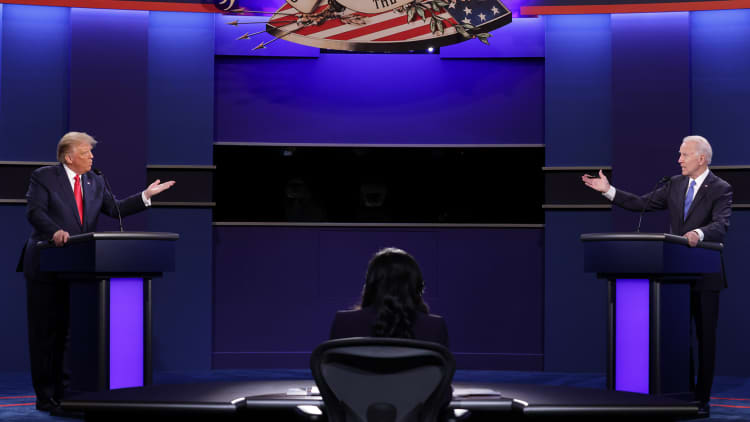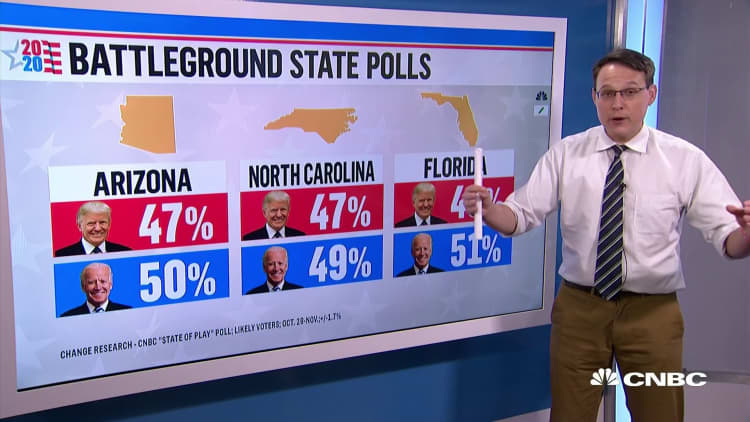LONDON — The potential for a protracted contest following Tuesday's U.S. election means European markets may face a more volatile aftermath than in previous presidential races.
In 2016, the shock of President Donald Trump's victory sent European stocks south on the night, but the pan-European Stoxx 600 quickly shook it off and began a gradual incline which lasted around six months.
The European blue chip index also reacted positively to the decisiveness of former President Barack Obama's re-election against Mitt Romney in 2012, while 2008 was something of an anomaly owing to Obama's victory over John McCain falling during the financial crisis, with European stocks continuing to slide toward the multi-decade lows reached in March 2009.
Prior to this, following George W. Bush's re-election against John Kerry in 2004, European markets also entered a steady period of around six months of gains.
But given the risks of a disputed election and a process which rumbles on long after the polls close on Tuesday, the most comparable past scenario would be Bush's victory over Al Gore in 2000. A contested result in the key swing state of Florida ended up in the Supreme Court, with Gore eventually conceding in late December.
Markets worldwide were roiled during the delay in 2000, but with unprecedented quantities of mail-in ballots, a host of states set for close races and multiple election-related lawsuits already underway in many areas, analysts are expecting even more turbulence in the aftermath of Tuesday.
What's more, investors may have more focus on what the election outcome means for the prospect of fiscal stimulus, with Congress having been in deadlock over a new coronavirus aid bill for months.
Dispute and delay
"We thus believe a convincing win by either candidate would be market-positive in the short run, as it would eliminate the tail-risk of a contested outcome," said Emmanuel Cau, head of European equity strategy at Barclays, in a note Monday.
Cau noted that the contested election of 2000 saw European and U.S. equities fall by around 10% the following month, while bond yields moved lower and defensives outperformed.
Trump hinted at a campaign rally in Reading, PA on Saturday that he intends to use the Supreme Court, which now has a 6-3 conservative lean, to secure the election if he is unable to do so at the ballot box. Such a move would very likely have a destabilizing effect on markets and lead to widespread civil unrest.

Part of the reason markets are seeking a certain outcome in either direction is to solidify hopes for a new coronavirus aid package, which would suffer further delays in the event of a contested election at a time when Covid-19 cases are spiking across the country.
"Over the long run, though, we find that elections have little lasting impact on markets, which means equities should resume their uptrend once the new president is known and the dust settles," Cau added. "Value has typically led post-election rallies."
Tax, trade and stimulus
Most polls have Biden ahead in both the national vote and a majority of key swing states, and Cau suggested that a Democratic sweep of the White House, Senate and House of Representatives may be seen as more beneficial to Europe.
"This is due to possibly reduced trade uncertainty, stronger ties with the U.S. and greater stimulus lifting the reflation trade," he said.
"We see three main areas where Democratic policy could impact European equities: corporate tax, stimulus (infrastructure and green) and trade, and also support secular themes such as ESG, digitalization and decarbonization."
An increase in the corporate tax rate from 21% to 28% under a Biden administration would be more negative for U.S. than European equities, according to Barclays, but European companies with exposure to the U.S. that benefited from Trump's 2017 tax cuts may see a slight hit to their earnings per share.

The Democrats' $2 billion spending plan to help shore up the economy from the fallout of the pandemic is considerably larger and markedly different in content to that of their Republican counterparts.
"Over recent weeks, equities have rallied and bond yields risen on occasions when the perceived chance of a Democratic win has gone up, and vice versa," said Jonas Goltermann, senior markets economist at Capital Economics.
"That is probably because Democrats favor more spending than Republicans, so a win for their candidate for president, Joe Biden, combined with a 'Blue wave' sweep where Democrats won majorities in both the House of Representatives and the Senate, is perceived as the outcome that would deliver the largest fiscal boost and therefore the most help for risky assets."
In a note Friday, Goltermann suggested that the prospect of greater stimulus was outweighing the perceived downside market risks in Democrats' election pledges, such as corporate tax hikes, healthcare reform and increased regulation.

